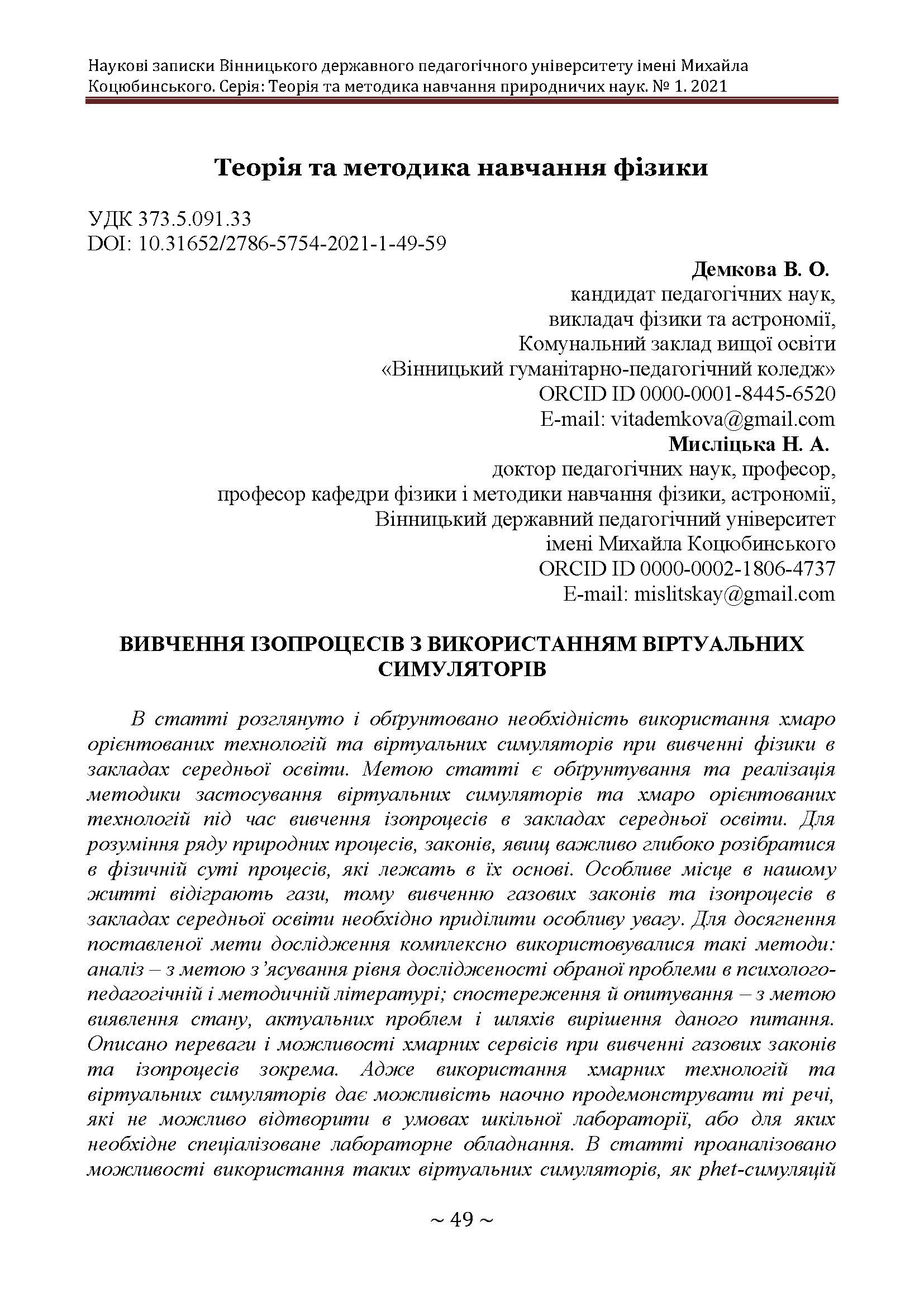Abstract
The article considers and substantiates the need to use cloud-based technologies and virtual simulators in the study of physics in secondary education. The aim of the article is to substantiate and implement the methodology of using virtual simulators and cloud-based technologies in the study of isoprocesses in secondary education. To understand a number of natural processes, laws, phenomena, it is important to deeply understand the physical essence of the processes that underlie them. Gases play a special place in our lives, so the study of gas laws and isoprocesses in secondary education should be given special attention. To achieve the goal of the study, the following methods were used comprehensively: analysis - in order to determine the level of research of the selected problem in the psychological, pedagogical and methodological literature; observation and survey -
in order to identify the state, current problems and ways to solve this problem. The
advantages and possibilities of cloud services in the study of gas laws and isoprocesses in particular are described. After all, the use of cloud technologies and virtual simulators makes it possible to clearly demonstrate those things that can not be reproduced in a school laboratory, or which require specialized laboratory equipment. The article analyzes the possibilities of using such virtual simulators as phet-simulations of the site Phet.colorado.edu and simulators of the site "Physics at school". The advantages of both cloud-oriented tools are analyzed. Examples of the use of these didactic tools at different stages of the educational process (acquisition of knowledge, formation of skills and abilities), which will increase the effectiveness of the formation of students' activity component of the content of physical education. The basic skills that are formed and developed in students as a result of their work with virtual objects of models in experimental physics at different levels of research activities of the individual: cognitive, praxeological, axiological and sociobehavioral. As a result of combining traditional and modern teaching aids in the educational process of physics, students not only deepen their understanding of physical phenomena, processes, laws, but also develop the ability to work with virtual simulators, virtual laboratories, cloud-based tools and more.
References
Бучинська Д.Л. Використання хмаро орієнтованих технологій для удосконалення професійної діяльності викладача. Відкрите освітнє е-середовище сучасного університету. 2016. № 2. С. 120-126. URL: https://openedu.kubg.edu.ua/journal/index.php/openedu/article/view/57/77#.V_dGBWLSUk (дата звернення: 22.05.2021)
Демкова В.О. Використання віртуальних моделей в процесі підготовки до виконання студентами реального експерименту з загальної фізики. Збірник матеріалів Міжнародної науково-практичної конференції [«Актуальні проблеми природничо-математичної освіти в середній і вищій школі»], (Херсон 13-15 вересня 2018 р.) / Укладач: В.Д. Шарко. Херсон: Видавництво ХНТУ, 2018. С. 74-76.
Навчальна програма для загальноосвітніх навчальних закладів з фізики для 10-11 класів. URL: https://mon.gov.ua/ua/osvita/zagalna-serednyaosvita/navchalni-programi/navchalni-programi-dlya-10-11-klasiv (дата звернення: 03.05.2021).
Шут М.І., Банак Р.Д. Особливості навчання фізики в закладах середньої освіти ІІ ступеня. Науковий часопис Національного педагогічного університету імені М.П. Драгоманова. Серія 3. Фізика і математика у вищій і середній школі. Випуск 21: збірник наукових праць. Київ: Вид-во НПУ імені М.П. Драгоманова, 2019. 84 с.
Юрченко А.О., Хворостіна Ю.В. Віртуальна лабораторія як складова сучасного експерименту. Науковий вісник ужгородського університету. Серія: «Педагогіка. Соціальна робота». 2016. Вип. 2 (39). С. 281-283.

This work is licensed under a Creative Commons Attribution 4.0 International License.
Copyright (c) 2021 Віта Демкова, Наталія Мисліцька

